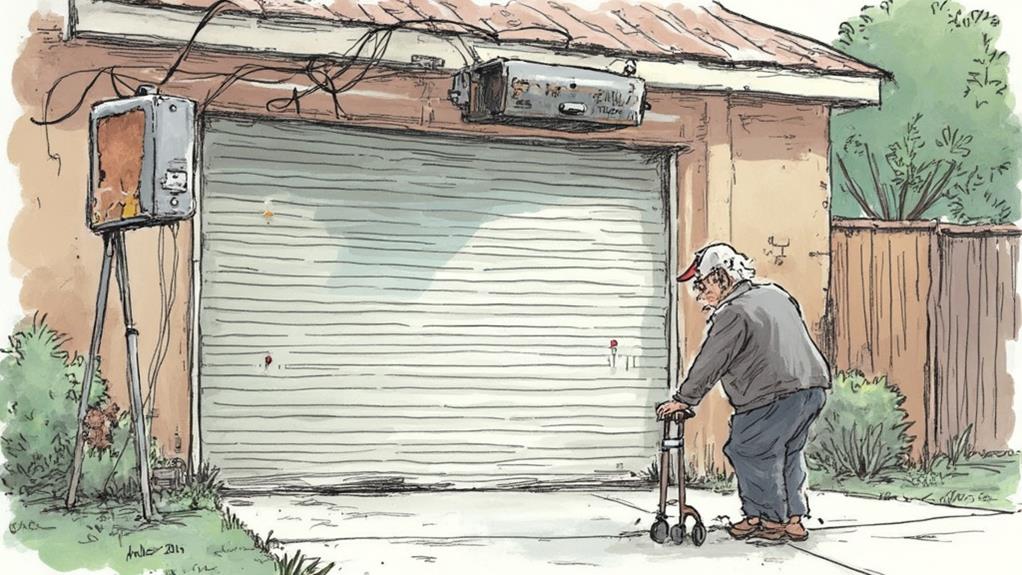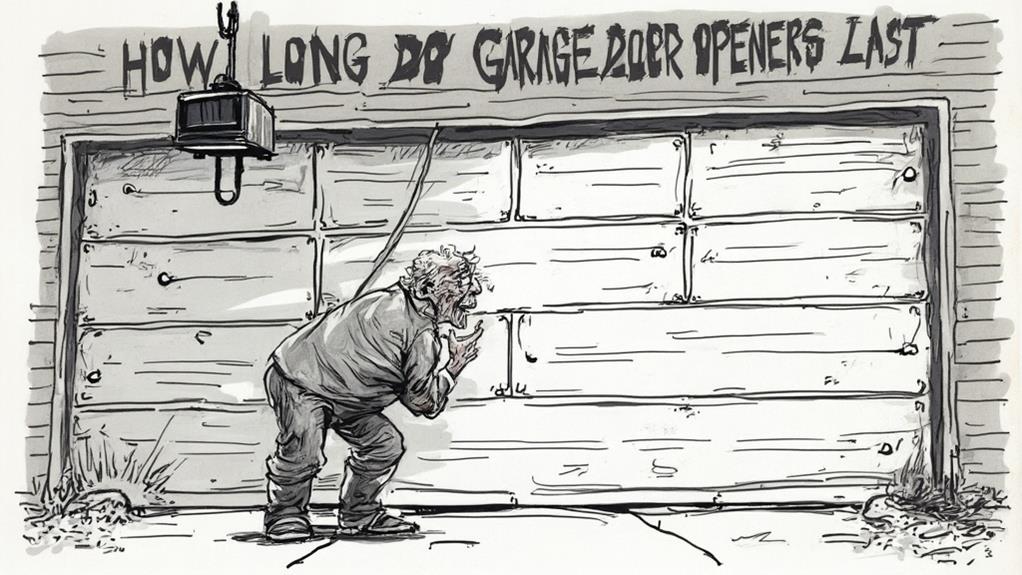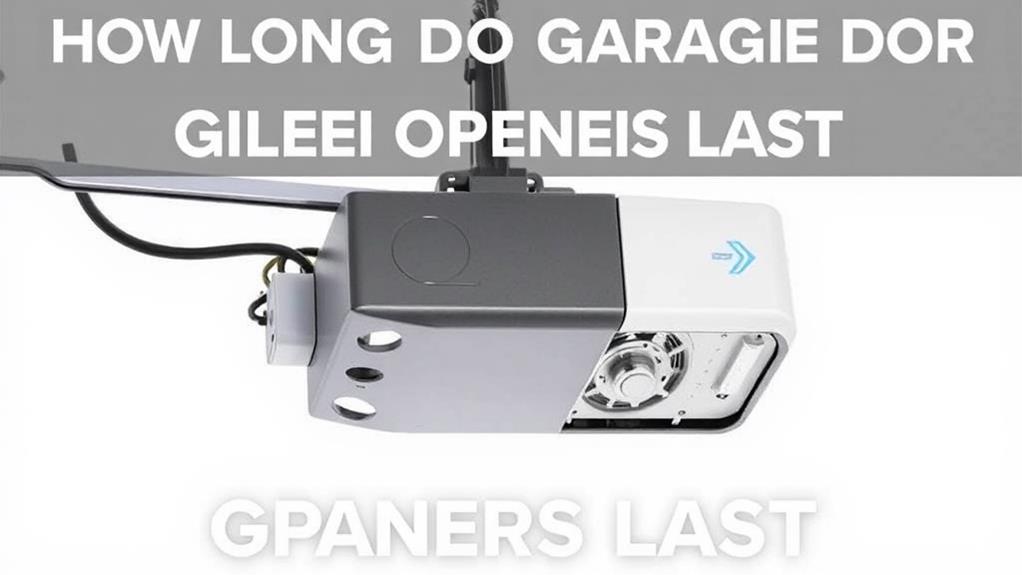
How Long Do Garage Door Openers Last?
Garage door openers typically last between 10 to 15 years, but their lifespan can vary considerably based on several factors. High-end models may endure up to 20 years with proper care, while budget options might need replacement after 7-8 years. The longevity of your opener depends on factors such as installation quality, usage frequency, environmental conditions, and regular maintenance. Signs of an aging opener include unusual noises, inconsistent performance, and visible wear. To maximize your opener's lifespan, perform regular inspections, lubricate moving parts, and address issues promptly. Understanding these factors can help you make informed decisions about your garage door opener's maintenance and eventual replacement.
Average Lifespan of Openers

Garage door openers typically have a lifespan ranging between 10 to 15 years. This duration can vary based on several factors including the frequency of use, the quality of installation, regular maintenance, and environmental conditions.
At Future Garage Door, we offer professional installations of new garage doors and openers, ensuring a quality setup that can affect the longevity of your system. Regular maintenance, a service we also provide, plays an essential role in the longevity of your opener.
As your opener begins to age, you may start to notice increased noise during operation, inconsistent performance, or a need for more frequent repairs. These signs may indicate that it's time for a replacement.
Typical Lifespan Ranges
Garage door openers typically last between 10 to 15 years before needing replacement. However, this range can vary depending on several factors, including usage frequency, maintenance, and the quality of the opener. Some high-end models may last up to 20 years with proper care, while budget options might need replacement after just 7-8 years.
What influences your opener's lifespan? Daily use plays a significant role; if you're frequently operating your garage door, you'll likely need to replace the opener sooner. Environmental conditions also impact longevity. Openers in regions with extreme temperatures or high humidity may wear out faster than those in milder climates.
To maximize your opener's lifespan, consider regular maintenance. Lubricating moving parts, tightening hardware, and checking for signs of wear can extend its useful life. Additionally, upgrading to newer models with advanced features like battery backup or smartphone connectivity might be worthwhile if your current opener is nearing the end of its expected lifespan. Remember, safety should be your primary concern; if your opener shows signs of malfunction or inconsistent operation, it's essential to have it inspected or replaced promptly to avoid potential accidents or security risks.
Factors Affecting Longevity
The average lifespan of garage door openers is influenced by several key factors. The quality of the initial installation plays an essential role; a properly installed opener will experience less strain and wear over time. How frequently you use your garage door also impacts longevity. If you're opening and closing it multiple times daily, you'll likely need to replace it sooner than someone who uses it less often.
The environment in which your opener operates is another significant factor. Is your garage exposed to extreme temperatures, humidity, or dust? These conditions can accelerate wear and tear on the opener's components. Regular maintenance is crucial to extending your opener's life. Are you lubricating moving parts, tightening hardware, and addressing minor issues promptly? Neglecting these tasks can lead to premature failure.
The quality and brand of the opener itself matter too. Have you invested in a reputable brand known for durability? Higher-end models often incorporate better materials and more robust designs, potentially lasting longer than budget options. Additionally, technological advancements in newer models may offer improved reliability and longevity compared to older versions.
Signs of Aging Openers
Vigilance is key when it comes to identifying signs of an aging garage door opener. As your opener approaches the end of its lifespan, you'll likely notice several telltale indicators. Does your opener make unusually loud noises during operation? This could be a sign of worn gears or a failing motor. Pay attention to inconsistent performance, such as the door stopping midway or reversing unexpectedly. These issues may point to deteriorating sensors or control boards.
Look out for visible signs of wear and tear, including rust on metal components or frayed cables. If you're constantly replacing batteries in your remote controls, it might indicate a weakening signal from the opener's main unit. Are you noticing increased energy consumption? An aging opener may draw more power to compensate for declining efficiency. Additionally, if your opener struggles to lift the door smoothly or requires multiple attempts to close it completely, these are clear signs of a system nearing the end of its operational life. Remember, modern safety features are important; if your opener lacks these, it's time to consider an upgrade for both functionality and security.
Benefits

When you install a garage door opener, you're investing in more than just convenience. This investment also includes professional installation and potentially repairing or replacing parts like springs, openers, and cables, ensuring the long-lasting functionality of your garage door.
You'll benefit from enhanced home security through remote-controlled access and automatic locking features, while also increasing your property's value and curb appeal. Additionally, modern openers often come with energy-efficient features, such as LED lighting and smart home integration, which can help reduce your overall energy consumption and utility costs.
Enhanced Home Security
Offering more than just convenience, modern garage door openers greatly boost your home's security. These devices employ advanced technologies to protect your property and deter potential intruders. You'll find that many contemporary models feature rolling code technology, which generates a new access code each time you use the opener, preventing code theft or duplication.
Have you considered the benefits of smart garage door openers? They allow you to monitor and control your garage door remotely via smartphone apps, enabling you to check if you've left it open or close it from anywhere. Some systems even integrate with home security networks, alerting you to unauthorized access attempts.
Additionally, many openers now come equipped with battery backup, ensuring functionality during power outages and maintaining your home's security. Look for models with automatic reversal systems and infrared sensors, which prevent the door from closing on objects or people, enhancing both safety and security.
Premium openers may also include vacation mode settings, disabling remote controls while you're away, and tamper-resistant housings to thwart manual forced entry attempts. Invest in these security features to immensely fortify your home's first line of defense.
Convenience and Accessibility
Modern garage door openers are a game-changer for homeowners, offering unparalleled convenience and accessibility. With these devices, you'll no longer need to manually lift heavy doors or exit your vehicle in inclement weather. Most models come equipped with remote controls, allowing you to operate your garage door from the comfort of your car. Some advanced systems even integrate with smartphones, enabling you to control your garage door from anywhere in the world.
Have you considered the benefits for those with mobility issues? Garage door openers provide essential assistance, making it easier for individuals with physical limitations to enter and exit their homes. Many models also feature safety sensors that prevent the door from closing if an obstruction is detected, ensuring the well-being of family members and pets.
Additionally, these devices often come with built-in lighting systems that illuminate your garage upon entry, enhancing visibility and security. Some openers even offer programmable access codes, allowing you to grant temporary entry to service providers or guests without compromising your home's security. Ultimately, garage door openers streamline your daily routine, saving time and effort while providing a safer, more accessible home environment.
Increased Property Value
Installing a garage door opener can drastically boost your home's value. When potential buyers view your property, they'll appreciate the convenience and security that an automated garage door system provides. This addition can set your home apart from others on the market, potentially leading to a quicker sale and a higher selling price. Have you considered how this seemingly small upgrade can make such a significant impact?
Beyond the immediate financial benefits, a garage door opener enhances your home's overall functionality. You'll enjoy the ease of access during inclement weather, improved security features, and the ability to control your garage door remotely. These factors contribute to a more desirable living space, which translates to increased property value. Additionally, newer models often come with energy-efficient features, further adding to your home's appeal and potentially reducing energy costs. When you're ready to sell, highlight these advantages to prospective buyers. Remember, a well-maintained garage door opener can last 10-15 years, making it a worthwhile investment that will continue to add value throughout its lifespan. Consider consulting with a real estate professional to understand how this upgrade specifically impacts your local market.
Energy Efficiency Improvements
With energy efficiency at the forefront of homeowners' minds, garage door openers have evolved to meet these demands. Modern units incorporate advanced technologies to reduce power consumption and minimize environmental impact.
You'll find that many new models feature DC motors, which aren't only quieter but also more energy-frugal than their AC counterparts. These motors use less electricity during operation and often include soft start and stop functions, further reducing energy spikes.
Have you considered the benefits of LED lighting in garage door openers? Unlike traditional incandescent bulbs, LEDs consume remarkably less power while providing superior illumination. Additionally, some manufacturers now offer openers with standby power modes, automatically reducing energy consumption when the unit isn't in use.
You might also encounter models with solar compatibility, allowing you to harness renewable energy to power your opener. When selecting a new garage door opener, look for Energy Star certification, which indicates the product meets strict energy efficiency guidelines set by the U.S. Environmental Protection Agency and the Department of Energy. By choosing an energy-efficient opener, you're not only reducing your carbon footprint but also potentially lowering your electricity bills over time.
Maintenance Tips for Longevity

To safeguard your garage door opener's longevity, you'll need to implement a regular maintenance routine. Start by conducting frequent inspections and cleaning, which will help you identify and address potential issues before they become major problems. Don't forget to lubricate all moving parts and tighten any loose hardware components, as these steps are essential for smooth operation and preventing unnecessary wear and tear.
| Maintenance Task | Frequency | Tools Needed | Benefits | Difficulty Level |
|---|---|---|---|---|
| Inspection | Monthly | Flashlight | Early problem detection | Easy |
| Cleaning | Quarterly | Soft cloth, mild detergent | Prevents debris buildup | Easy |
| Lubrication | Bi-annually | Silicone-based lubricant | Reduces friction | Medium |
| Hardware check | Annually | Wrench, screwdriver | Prevents loosening | Medium |
| Balance test | Annually | None | Ensures even operation | Easy |
Regular Inspection and Cleaning
Regular maintenance is the key to keeping your garage door opener running smoothly for years to come. To guarantee optimal performance, you should conduct a thorough inspection of your opener system at least twice a year.
Begin by examining the chains, belts, or screws for signs of wear, rust, or damage. Are they properly lubricated and tensioned? Next, check the safety sensors, typically located near the bottom of the garage door tracks. Ensure they're aligned correctly and free from dirt or debris that could impede their function.
Don't forget to clean the opener unit itself. Dust and grime can accumulate over time, potentially affecting its operation. Use a soft, dry cloth to wipe down the motor housing and other components. Pay special attention to the lens cover of the opener's light, as a dirty cover can reduce illumination. While cleaning, listen for any unusual noises that might indicate a problem. Are there any grinding or squealing sounds when the door operates? If so, it's time to investigate further or call a professional.
Lubrication of Moving Parts
Proper lubrication is the lifeblood of your garage door opener's moving parts. To guarantee your opener's longevity, you'll need to regularly apply lubricant to key components.
Start by lubricating the chain or belt drive, which connects the motor to the trolley. Use a silicone-based spray lubricant, as it won't attract dirt or grime like oil-based products.
Next, focus on the garage door's hinges, rollers, and springs. These components bear significant weight and friction, making proper lubrication vital for smooth operation.
How often should you lubricate? Generally, every six months is sufficient, but in areas with extreme temperatures or high humidity, you may need to increase the frequency.
When lubricating, don't forget the torsion spring (if your door has one) and the ball bearings in the rollers. Are you hearing squeaks or grinding noises? These are clear indicators that it's time to lubricate.
Tightening Loose Hardware Components
The backbone of a well-functioning garage door opener lies in its hardware components. Over time, these parts can loosen due to vibration and regular use, potentially compromising the system's efficiency and safety. To maintain your opener's longevity, it's essential to periodically inspect and tighten any loose hardware.
Begin by examining the opener's mounting brackets, verifying they're securely fastened to both the ceiling and the opener unit. Are the bolts and nuts snug? If not, tighten them carefully with the appropriate tools.
Next, check the chain or belt drive for proper tension. Is it sagging or overly taut? Adjust it according to the manufacturer's specifications. Don't forget to inspect the trolley, which connects the opener to the door. Are its bolts secure? Tighten them if necessary. Pay special attention to the hinges, rollers, and track brackets. These components endure significant stress and may require more frequent tightening.
Frequently Asked Questions
Can I Replace Just the Motor in My Garage Door Opener?
You can replace just the motor in your garage door opener, but it's often not cost-effective. It's usually better to replace the entire unit. Consider consulting a professional to assess your specific situation and explore your options.
Are Smart Garage Door Openers Worth the Investment?
Smart garage door openers can be a worthwhile investment. You'll enjoy convenience, remote access, and enhanced security features. They're compatible with home automation systems and can alert you to door activity. Consider your needs and budget before deciding.
How Much Does It Cost to Replace a Garage Door Opener?
You'll typically spend between $150 and $500 to replace a garage door opener. The cost varies based on the model you choose, its features, and whether you opt for professional installation or do it yourself.
Can Extreme Temperatures Affect the Lifespan of My Garage Door Opener?
Yes, extreme temperatures can impact your garage door opener's lifespan. Excessive heat or cold can strain the motor, damage electrical components, and affect lubricants. To protect it, you'll want to insulate your garage and maintain your opener regularly.
Is It Possible to Upgrade an Old Garage Door Opener to a Newer Model?
Yes, you can upgrade your old garage door opener to a newer model. You'll need to guarantee compatibility with your existing door and track system. It's often a straightforward process, but you might wish to ponder professional installation for best results.





